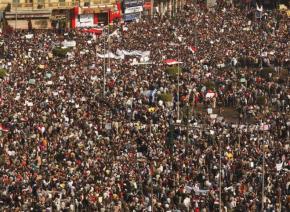The military is the guardian of dictatorship
Anger is on the boil again in Egypt after Army forces apparently fired live ammunition at the occupiers of Tahrir Square in Cairo early on March 9, killing one person and injuring many more. The Supreme Council of the Armed Forces, which took power after the downfall of Hosni Mubarak two months ago, claims the Army didn't shoot--but numerous witnesses to the violence say the gunfire came from soldiers stationed around the square.
The deadly confrontation came as the military brass on the Supreme Council are under increasing pressure to grant the political and economic demands of the millions of Egyptians who made the revolution against Mubarak. With the violence over the weekend, more and more people are becoming suspicious of council members like Field Marshal Mohamed Hussein Tantawi and Gen. Sami Hafez Anan.
The issued this statement on April 9 condemning the attack on Tahrir demonstrators and looking ahead to the next stage of the struggle in Egypt.
The Military Council is the guardian of dictatorship and corruption
The attacks by the armed forces on unarmed demonstrators at dawn Saturday using live bullets and tear gas, and their attempt to terrify protesters with armored cars, puts the Military Council clearly in the camp of counter-revolution.
The attempts to break up the protest camp can have no other meaning except that the Military Council is defending the interests of the corrupt thieves who stole from the Egyptian people for the past 30 years. The generals who sit at the top of the pyramid in the Army are part of Mubarak's corrupt gang, and it is they who have the task of protecting the system of thieving and corruption after his fall. Now is the time to get rid of them, just as the revolutionaries finished off Mubarak.
After today, nobody will be fooled by the slogan "the army and the people are one hand." For the past two months that the Military Council has held power, it has crushed protests and tortured demonstrators and dragged them before the military courts.

This time, however, the Army did not act alone in its attempts to break up the sit-in, but worked hand-in-glove with the police. This means that the army and the police are "one hand" against the people, and that their hands are stained with the blood of the revolutionaries.
It therefore falls to the people to get rid of them both, and to create a popular civilian authority which reflects the demands of the revolutionaries and realizes the aspirations of the Egyptian people to live in freedom and dignity.
This will mean bringing Mubarak and his henchmen to trial for the crimes they committed against the people, and the confiscation of all their assets.
Mubarak and his cronies will never be brought to trial while Tantawi and Anan and the other generals on the Military Council remain in power in Egypt, as they are part of his regime and embroiled in the corruption which swamped the country during his dictatorship.
We must continue our revolution until the country has been cleansed and Mubarak's Military Council has been removed from power.
Victory to the Revolution
Glory to the Martyrs


